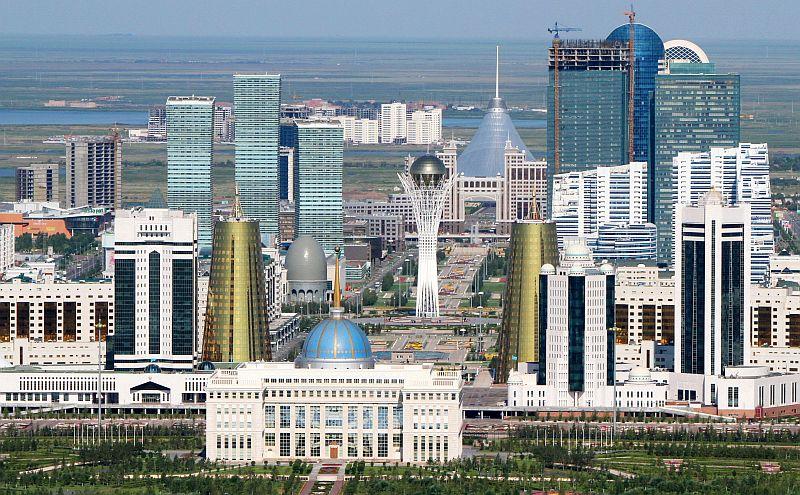ASTANA, Kazakhstan—Most people wouldn’t bother going half way around the world for their 15 seconds of fame. Ok, so maybe there was little fame to be found, but it was still worthwhile to spend two days flying back and forth to attend the two-day annual Eurasian Media Forum in Kazakhstan, a Central Asian nation that is actually the ninth largest country in the world, with ultra-wealthy oil and gas fields.
The forum here deals with political and media issues and attracts top journalists and policymakers to hold forth on panels.
What is especially interesting about the forum is that it discussed media and politics together because that’s a more honest reflection of how the real world works.
Let’s face it: we couldn’t have elections in America without a mass media that has become the main platform for politicians of every stripe through debates, ads, and daily news coverage. Most campaigns are fought in a media that now itself blatantly reflects the partisan divides in our culture.
Yet, the forum here has something else missing in American media discourse—a genuine international mix with many and diverse perspectives.
A country that was once part of the Soviet Union with many authoritarian institutions—including a mostly state controlled media—seems more open to real debate than the United States. Perhaps you have to travel far away from the dominance of the mainstream to actually discuss it.
A panel on the Middle East had an actual representative of the Assad government in Syria as well as a Syrian critic. It featured the eloquent British MP and war critic George Galloway along with a fellow at the right-wing Heritage Foundation who was actually critical of the “stupid” way the U.S. government managed its wars.
Al-Jazeera came in for some criticism. It was argued that the Qatar based channel has been misrepresenting the war in Syria because the Qatari government is also financing arms and mercenaries trying to topple its regime in the name of democracy. It was pointed out that the Qatar and Saudi Arabian royal families are not ruling over democracies.
A panel on Afghanistan featured a member of the Karzai government who was optimistic about the future and Pulitzer prize-winning U.S. journalist Roy Gutman who was anything but.
There were divided opinions on whether Afghanistan can survive a U.S. troop phaseout but there were also facts I hadn’t heard before about existing pro-Taliban voices in Parliament now as well the government’s efforts to negotiate.
It was pointed out that the internationally trained Afghan army may be able to replace the Americans who are supposed to pull out in 2014, but that the police are incompetent and corrupt despite all the money invested in their forces.
There were lots of concerns about the continued export of Afghan opium that is not just going to the West but through Russia as well.
There were several media panels with journalist Greg Palast challenging those who would regulate the Internet in the name of protecting the public. ”The Internet is the solution to government censorship,” he insisted.
I added some concerns about all the money governments, including my own, are spending in monitoring and trying to regulate the online world in the name of cybersecurity. It is not just a potential threat to Internet freedom, but it’s already happening. I said, with many in the room nodding in support.
Trends
The final session looked at media trends for the future where many print publications in the United States, but not necessarily in other regions, are facing challenges to their business models and survival. At the same time, social media and many online networks are thriving.
Media freedom is at risk, several journalists argued, more from the corporations that own and control media—including more right-wing enterprises like Koch industries that intend to buy more media outlets—rather than from government controls.
Another part of the problem is that the lines between news and entertainment are getting fuzzier, while more commercialization threatens investigative journalism.
The forum’s founder, Diriga Nazarbayev, the daughter of the country’s President Nursultan Nazarbayev, closed the llth session of the forum held in a brand new and fancy media center in the country’s recently built capital Astana, with an appeal for more media literacy education.
She spoke of children able to operate iPads before they know how to read, and yet do not really know how the ‘brave new” media environment they have been born into works. She suggested media education must become part of school curriculums.
In her speech, she noted how the media had changed just since the forum began.
“We have seen evolving amid a global media revolution,” she said.
“We see that in the past 10 to 15 years alongside the development of satellite and cable television, wider use of the Internet, smartphones, tablet computers and other technical novelties media started playing a much more substantial role in the life of people and the society, compared with how it was, for instance, 10 years ago.
“The media revolution and new technologies have changed our world beyond recognition. The changes that took place literally before our eyes never fail to amaze us.
“Among certain groups of the audience this causes some kind of exhilaration, euphoria and heightened expectations that new technologies, per se, will solve all life problems. However, the good and the bad go hand in hand. Sometimes distinguishing one from the other is very difficult.”
Discussions like these are important. It is significant that this one was organized with the support of a government not known as supporter of a free press, and drew delegates and speakers from all over the world.
Media influences all of our lives. We all need to take more time to understand how it works and how we can try to transform it.
News Dissector Danny Schechter blogs at Newsdissector.net, and edits Mediachannel.org. Comments to [email protected]




